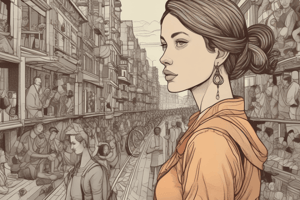Podcast
Questions and Answers
What does gender refer to?
What does gender refer to?
- The expectations and responsibilities associated with being male or female
- The social, cultural, and psychological aspects of being male or female (correct)
- Biological characteristics that define males and females
- The physical characteristics that define males and females
What are traditional masculine roles in a society?
What are traditional masculine roles in a society?
- Athlete, competitor, aggressive
- Breadwinner, protector, strong (correct)
- Caregiver, nurturer, emotional
- Educator, artist, creative
What is an example of gender inequality?
What is an example of gender inequality?
- Men and women having equal access to education
- Men earning more than women for the same work
- Women earning less than men for the same work (correct)
- Men and women having equal job opportunities
How does gender socialization occur?
How does gender socialization occur?
What is intersectionality?
What is intersectionality?
What is an example of gender and power?
What is an example of gender and power?
What is gendered violence?
What is gendered violence?
What is the wage gap?
What is the wage gap?
Flashcards are hidden until you start studying
Study Notes
Gender and Society
Definition of Gender
- Gender refers to the social, cultural, and psychological aspects of being male or female
- Different from biological sex, which refers to the physical characteristics that define males and females
Gender Roles
- Gender roles are the expectations and responsibilities associated with being male or female in a particular society
- Gender roles are shaped by cultural, social, and historical factors
- Examples of gender roles:
- Traditional masculine roles: breadwinner, protector, strong
- Traditional feminine roles: caregiver, nurturer, emotional
Gender Inequality
- Gender inequality refers to the unequal distribution of power, resources, and opportunities between men and women
- Examples of gender inequality:
- Wage gap: women earn less than men for the same work
- Limited access to education and job opportunities for women
- Gender-based violence and discrimination
Gender Socialization
- Gender socialization is the process by which individuals learn and internalize gender roles and expectations
- Gender socialization occurs through:
- Family and upbringing
- Education and media
- Peer relationships and cultural norms
Intersectionality
- Intersectionality is the understanding that gender intersects with other social categories, such as race, class, and sexuality, to produce unique experiences of discrimination and oppression
- Examples of intersectionality:
- Black women facing both racism and sexism
- LGBTQ+ individuals facing discrimination based on their sexual orientation and gender identity
Gender and Power
- Gender is closely tied to power and privilege in society
- Men have historically held more power and privilege than women, leading to gender inequality
- Examples of gender and power:
- Patriarchy: a system of social organization in which men hold power and women are subordinate
- Gendered violence: men are more likely to be perpetrators of violence, while women are more likely to be victims
Gender and Society
Definition of Gender
- Gender is a social construct that encompasses cultural, social, and psychological aspects of being male or female.
- It is distinct from biological sex, which refers to physical characteristics that define males and females.
Gender Roles
- Gender roles are societal expectations and responsibilities associated with being male or female.
- These roles are shaped by cultural, social, and historical factors, and influence individual behavior and identity.
- Traditional gender roles include:
- Masculine roles: breadwinner, protector, strong, and aggressive.
- Feminine roles: caregiver, nurturer, emotional, and submissive.
Gender Inequality
- Gender inequality refers to the unequal distribution of power, resources, and opportunities between men and women.
- Examples of gender inequality include:
- Wage gap: women earn 79 cents for every dollar earned by men.
- Limited access to education and job opportunities for women.
- Gender-based violence, discrimination, and marginalization.
Gender Socialization
- Gender socialization is the process by which individuals learn and internalize gender roles and expectations.
- This process occurs through:
- Family and upbringing: parents and caregivers teaching gender roles.
- Education and media: learning gender stereotypes from school and media.
- Peer relationships and cultural norms: peer pressure and societal expectations influencing behavior.
Intersectionality
- Intersectionality recognizes that gender intersects with other social categories, such as race, class, and sexuality.
- This intersection produces unique experiences of discrimination and oppression, including:
- Black women facing both racism and sexism.
- LGBTQ+ individuals facing discrimination based on their sexual orientation and gender identity.
Gender and Power
- Gender is closely tied to power and privilege in society.
- Men have historically held more power and privilege, leading to gender inequality.
- Examples of gender and power include:
- Patriarchy: a system of social organization in which men hold power and women are subordinate.
- Gendered violence: men are more likely to be perpetrators of violence, while women are more likely to be victims.
Studying That Suits You
Use AI to generate personalized quizzes and flashcards to suit your learning preferences.




